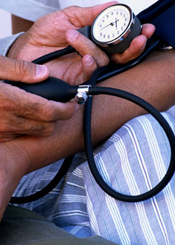- Clinical Technology
- Adult Immunization
- Hepatology
- Pediatric Immunization
- Screening
- Psychiatry
- Allergy
- Women's Health
- Cardiology
- Pediatrics
- Dermatology
- Endocrinology
- Pain Management
- Gastroenterology
- Infectious Disease
- Obesity Medicine
- Rheumatology
- Nephrology
- Neurology
- Pulmonology
Controlling Blood Pressure in Chronic Renal Disease: Nighttime Is the Right Time
The authors’ opening salvo seems to say it all (again). . . “A patient’s nocturnal BP profile, without the pressor effect of physical activity, emotional stress, and environmental factors that are usually present during the day, is more representative of the true BP status and a stronger predictor of cardiovascular outcomes.”

The authors’ opening salvo in a newly published study seems to say it all (again) . . . “A patient’s nocturnal BP profile, without the pressor effect of physical activity, emotional stress, and environmental factors that are usually present during the day, is more representative of the true BP status and a stronger predictor of cardiovascular outcomes.”1
Earlier comments were made on this site about the solid predictability regarding risk consequent to nocturnal blood pressures in hypertensive patients. Now another study has similarly addressed hypertensive persons with chronic kidney disease (N=436).1
Office, daytime, and nighttime ambulatory blood pressures were evaluated in this cohort of patients (average age, 65.1 years; glomerular filtration rate [GFR], 42.9 μL/min/1.73 m2) with chronic kidney disease. Systolic ambulatory BP was a better predictor of adverse outcomes than diastolic readings. Patients with daytime systolic blood pressures higher than 146 mm Hg had an increased risk of cardiovascular endpoints (fatal and nonfatal cardiovascular events requiring hospitalization, such as MI, heart failure, stroke, revascularization, peripheral vascular disease, and non-traumatic amputation) and renal endpoints (end-stage renal disease [ESRD] or death) as well. In contrast, nighttime systolic pressures of 125 to 137 mm Hg, as well as pressures higher than 137 mm Hg, also increased the risk of reaching cardiovascular and renal endpoints (compared with systolic pressures of 106 to 114 mm Hg).
The previously accepted gold standard-that is, office measurement of blood pressure-did not predict the risk of the cardiac or renal endpoints. This predictive role for ambulatory measurements of blood pressure is independent of other risk factors, such as diabetes, cardiovascular disease, proteinuria, hemoglobin level, and GFR. Overall, nighttime “ambulatory” systolic readings were the best predictors. Referring back to previous studies about the importance of nighttime readings, there was a 2-fold greater risk of cardiovascular events in this cohort when individuals were either non-dippers or, worse, reverse dippers during sleeptime.
The editorialists made another observation from the study results. White coat hypertension was common and was noted in 43.3% of the patients with chronic kidney disease. Office blood pressures in these folks may be misleading. If they are overtreated based on spuriously elevated BP readings in the office, perfusion (brain, coronary, kidney) may be compromised. These authors closed by saying, “We believe that there are selected cohorts of patients in whom the additional time, effort, and expense of doing ambulatory blood pressure monitoring is justified . . .”
It is now harder to defend reliance on clinic BP measurements alone if we nephrologists are serious about targeted blood pressure intervention.” What say all of you?
References:
1. Minutolo R, Agarwal R, Borrelli S, et al. Prognostic role of ambulatory blood pressure measurement in patients with nondialysis chronic kidney disease. Arch Intern Med. 2011;171:1090-1098.
2. Goldsmith D, Covic A. Ambulatory blood pressure measurements in chronic kidney disease: ready to (rock and) roll? Arch Intern Med. 2011;171:1098-1099.
